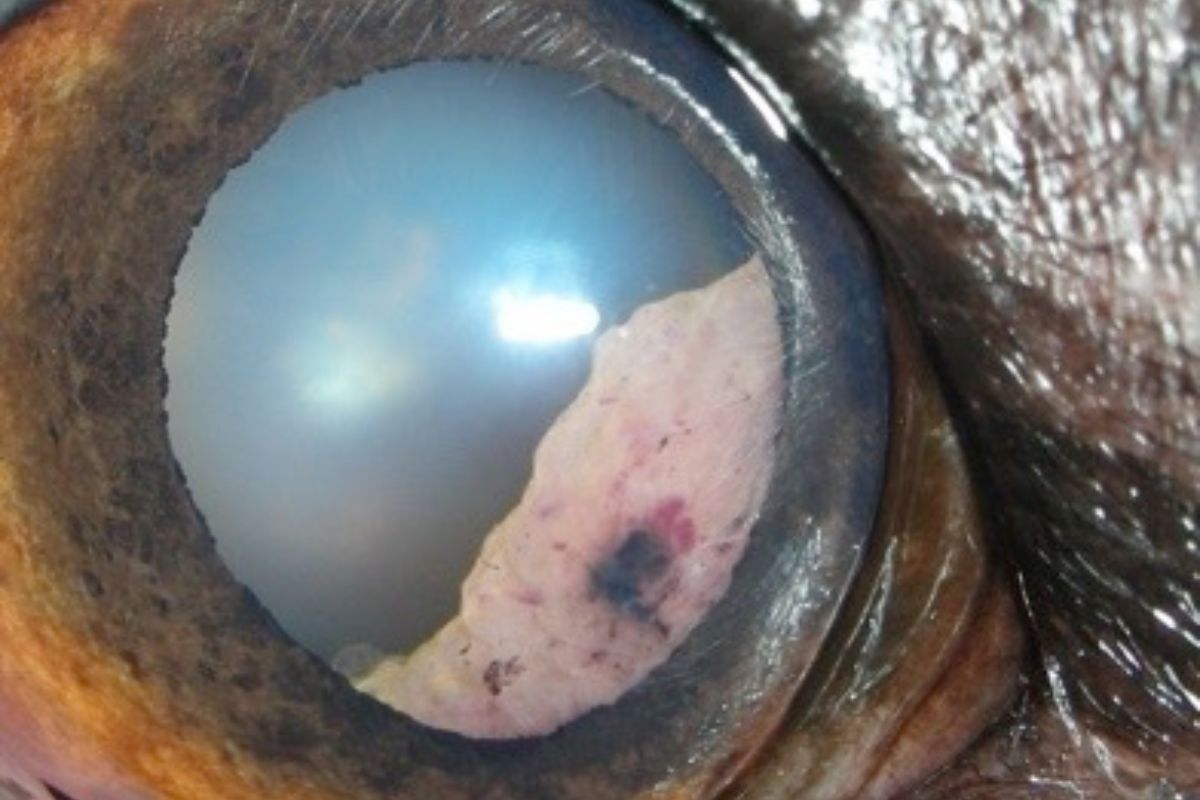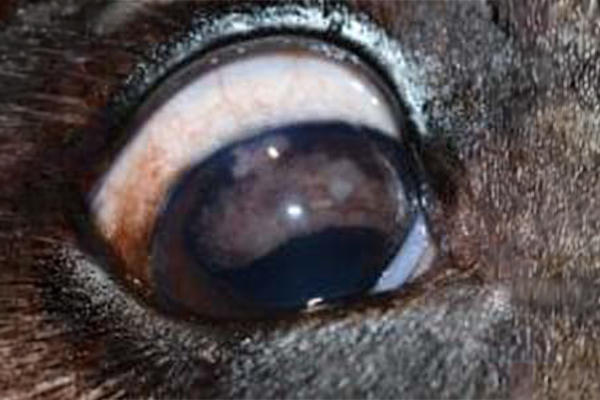Pet Intraocular Tumors in Spring, TX
Discovering tumors on your pet’s eyes is distressing, but you can rely on our expert care for pet intraocular tumors at North Houston Veterinary Ophthalmology for relief. Our veterinary specialists conduct expert diagnosis and treatment for this concerning condition in Spring, TX.

Pet Intraocular Tumors
Understanding Intraocular Tumors
What are Intraocular Tumors?
Intraocular tumors are growths within the eye that can be benign or malignant. Benign tumors are less aggressive, while malignant tumors are more likely to spread beyond the eye. These tumors can originate from the eye’s normal structures or result from metastasis (spread).
A definitive diagnosis typically involves a tissue sample to determine the tumor’s nature, but ocular ultrasound is a non-invasive diagnostic tool that is commonly utilized to help understand the extend of the changes within the eye.

Types of Intraocular Tumors
Various intraocular tumors can affect pets, with melanoma being the most common in dogs and cats. Melanoma primarily impacts the iris but can spread to other ocular regions. Initially, it may present as a few abnormal spots on the iris, but it can progress to severe changes, causing pain, loss of the eye, and metastasis. Early detection and intervention are crucial for managing this type of tumor. Other tumors can also develop within the eyes of dogs and cats, requiring specialized care.
Clinical Signs of Intraocular Tumors
Ocular Signs
The clinical signs of intraocular tumors vary depending on the tumor type and the affected eye structures. Common ocular signs include redness, squinting, cloudiness, elevation of the third eyelid, ocular discharge, visible mass inside the eye, changes in iris color, periocular swelling, abnormal deviation of the globe (strabismus), secondary glaucoma (elevated eye pressure), and vision loss.
Systemic Signs
If the tumor is systemic, additional signs such as enlarged lymph nodes, coughing, and loss of appetite may be present. These symptoms indicate the need for a comprehensive evaluation by a veterinary ophthalmologist.
Causes of Intraocular Tumors
Often, the exact cause of intraocular tumors is unknown. However, ocular trauma, particularly in cats, can lead to tumor formation. Systemic illnesses causing chronic changes in the eye may also trigger the transformation of cells into tumor cells. Given the numerous potential causes, it is vital to have any eye changes or injuries in pets evaluated by a veterinary ophthalmologist.
Treatment Options for Intraocular Tumors
Non-Invasive Procedures
Advanced imaging techniques, such as CT scans, MRIs, radiographs, and ultrasounds may be needed to assess the involvement of other tissues. Early detection of iris melanoma may allow for non-invasive laser procedures performed under general anesthesia to halt the tumor’s progression.
Advanced Imaging and Surgical Intervention
At North Houston Veterinary Ophthalmology, we utilize advanced imaging techniques, such as CT scans, MRIs, radiographs, and ultrasounds, to assess the involvement of other tissues. In cases where the tumor is aggressive or causes severe secondary ocular changes, surgical removal of the eye may be necessary. The removed eye is then submitted to a histopathologist to determine the tumor type and the need for additional treatments, such as chemotherapy, radiation, or further surgery.
Why Choose North Houston Veterinary Ophthalmology?
Our skilled team at North Houston Veterinary Ophthalmology combines expertise with compassion to provide the best care for pets with intraocular tumors. Our experienced veterinary ophthalmologist and compassionate team offers personalized treatment plans tailored to each pet’s needs. We provide comprehensive care, from initial diagnosis to advanced treatment options, ensuring that your pet receives the highest standard of veterinary ophthalmology services. Our commitment to pet health drives us to stay at the forefront of veterinary ophthalmology, continually updating our knowledge and skills. If you notice any signs of intraocular tumors in your pet, contact us to schedule an evaluation and ensure your pet receives the expert care they deserve.